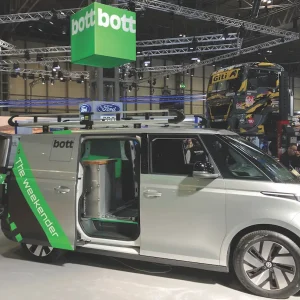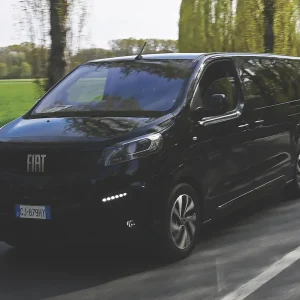New van sales have been on the road the road to recovery since early in 2010, but in recent months the growth in light van volumes has lagged behind the sales increases in other market sectors. In the first four months of the year, light van sales were up 4.3% to just under 18,000 units – but in both the medium and heavy van segments sales rocketed by more than 30%. The SMMT has suggested that a factor behind this trend could be that some operators are seeking to economise by maximising payload and load space capacities through switching to larger vans to reduce the number of delivery runs their vehicles need to make.
Commercial vehicle consultant Robin Dickeson agrees.
“Coming out of recession, industries are becoming more efficient,” he says. “The capital cost of a larger van is not much different but the amount of kit you can carry is enormously different.”
Nevertheless, the light van sector includes some of the biggest sellers in the market, such as VW’s Caddy and the Vauxhall Combo, and is also leading the way in the introduction of electric commercial vehicles.
Ford, with its Azure Transit Connect Electric, followed by Renault, with its ZE Kangoo Van will be first to market. Both are set to go on sale by the end of the third quarter of the year and attracted plenty of interest when they appeared at the Commercial Vehicle Show in April.
A spokesman for Renault says there was “phenomenal interest in the ZE Kangoo compared to the rest of the line-up at the CV Show”. Renault has declared its intention to be the leader in electric van sales and claims the ZE is “designed as a volume product – unlike its rivals”. The ZE Kangoo will cost just under £17,000 excluding VAT, plus a monthly charge of £59 for the battery lease.
The brand received a boost in May when residual value specialist Glass’s claimed battery leasing was likely to result in more favourable whole-life costs than including the battery in the purchase price. Its research showed that a vehicle with the battery included in the initial price would retain 35% of its value after three years/36,000 miles while one with a leased battery would keep 54% of its value over the same period.
Renault claims the electric Kangoo has the same load capacity (3-3.5cu/m) and payload (650kg) as its diesel siblings. According to a spokesman this is possible because “the battery and electronics weigh the same as a typical diesel engine so the engineers have managed to retain the good payload”.
Glass’s forecast on EV RVs was not such good news for Ford and its EV partner Azure Dynamics. The electric Connect will go on sale from this summer for £39,995 – battery included. While there is no loss to load volume in going electric, the manufacturer has admitted payload will drop by about 125kg to 465kg.
Initially just four Ford Retail dealerships will sell the electric Connect, although all 30 of the group’s sites will be able to service the van. In carefully managing its introduction, Ford and Azure aim to protect the van’s reputation by making sure it only goes to customers who will benefit from an electric vehicle, those working pre-defined, urban routes.
“It’s important at the start that you qualify customers,” says Azure’s European sales and marketing director Gary Whittam, who forecast sales of up to 500 Transit Connect Electrics this year.
As part of an overhaul of its entire CV line-up, Ford is to introduce an all-new Transit Connect within three years, including an Econetic version. In the meantime Euro5 engines will arrive this year.
VW launched its new Caddy at the end of 2010 with impressive new 1.6- and 2.0-litre diesel engines. The revision stoked up enough interest to see it finish just ahead of the Vauxhall Combo as the sector’s best seller on 10,848 units. The Caddy majors on build quality but is not the most radically styled van in the sector. VW did its best to add some lustre to its image by displaying the new Caddy Racer, at the CV Show, which is powered by a 2.0-litre petrol engine developing 270hp.
With the new model so recently launched there are no new additions to the range just yet, but the brand has introduced contract hire and finance lease offers on the new green Caddy Bluemotion starting from £199 per month with three years/30,000 miles free servicing.
Vauxhall is teaming up with Fiat to produce the next generation of its Combo, which is likely to bear more than a passing resemblance (under the skin at least) to the Italian maker’s highly regarded Doblo. Production will start in December this year and run to 250,000 units annually, extending to a lifetime total of about 1.3 million. An initial supply of 6000 vans will be built at the end of this year before the model is rolled out across Europe in 2012. The current model went on sale in 2001 but despite being long in the tooth, sales in the UK reached 10,477 last year.
Vauxhall is aiming to keep customers keen until the new arrival hits showrooms with offers such as £700 worth of free options on a Combo SE, including a Maxx Styling Pack, (with body-colour front and rear-quarter bumpers and door mirrors, and 15-inch alloys), sports front seats, driver’s seat height adjuster and near-side sliding door.
The manufacturer’s offer of four years’ free servicing, 0% APR financing, AA cover and warranty also applies, but as an alternative operators using the Low Emission Zone (LEZ) can get £4000 off a new Combo by exchanging a van of at least seven years old.
Fiat Professional is offering a six-month payment holiday to customers affected by the LEZ, requiring van buyers to pay just the VAT up front. In addition a finance rate of 1.1% is applied to selected vans, including the Doblo Cargo.
Citroen claims its Berlingo is the most versatile light van on offer in the UK.
“The Berlingo can now meet more business transport applications in its weight range than any other van available,” says a spokesman.
The manufacturer also boasts that the Berlingo is the only van in its class with Trafficmaster Smartnav satnav and Trackstar stolen vehicle tracking fitted as standard.
The Berlingo panel van is available with two bodywork sizes, L1 and L2, and a choice of three payloads – 625, 750 and 850kg.
Specialist conversions include platform cabs, freezer/chiller temperature controlled vans and glass carriers.
The used view
Dealers are baulking at paying strong money for one-to-three-year old stock due to the abundance of discounting on new vans, according to George Alexander, Glass’ CV editor. Trade buyers are therefore prepared to buy slightly older vehicles for stock, even if carrying minor damage. Tidy, price range lots are sought after and selling to Guide Trade prices.
Auction activity has slowed in recent weeks with buyers cautious and stock levels of high-mileage three-to-four-year old vans remaining high.
Alexander said mediocre vans were struggling to achieve “optimistic” reserve prices, which were “seemingly set without regard to the prevailing market circumstances”.





